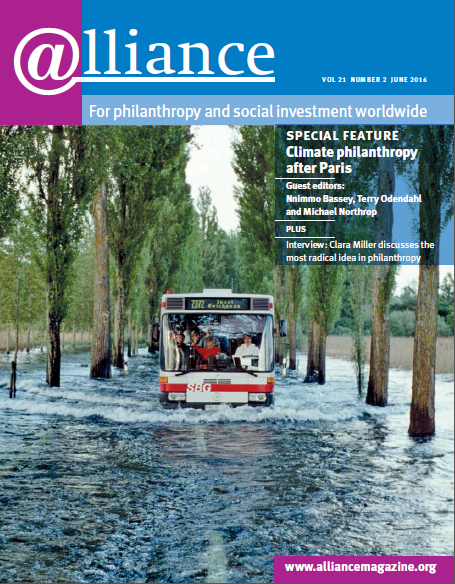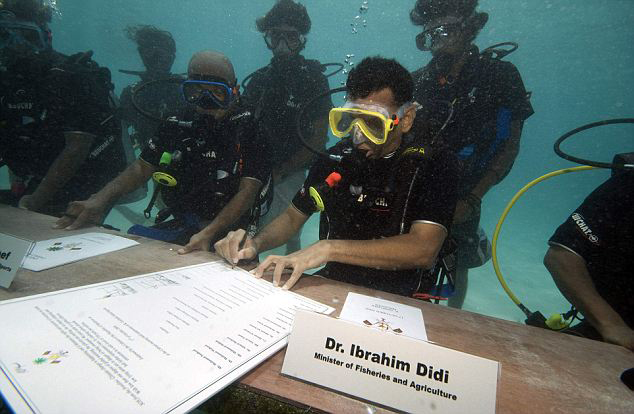We are now in a ʻno-analogue’ state according to University of Hawaioceanography professor, Dr Richard Zeebe. In other words, in the documented history of our planet, we have not seen the amount of carbon released combined with the speed with which we are depositing it in the atmosphere. We are entering a future without precedent.
As the climate responds to these rapid emissions, the impact on our livelihoods will become so great that millions of people will be displaced. For coral-rimmed nations like Kiribati, Tuvalu and the Maldives, their status as nation-states might be in question. They risk losing their territory, viability for growing food or producing fresh water – which for all intents and purposes renders them uninhabitable. For these reasons, the Intergovernmental Panel on Climate Change (IPCC) noted 26 years ago that the gravest effect of climate change might be the migration of peoples from one sensitive place to another.
‘Current estimates suggest that between 25 million and 1 billion people are victims of climate-induced migration.’
The plight of the ‘climate refugee’ is now emerging as a policy priority. Current estimates suggest that between 25 million and 1 billion people are victims of climate-induced migration. However, the lack of reliable data hinders our ability to understand the influence of climate impacts on short- and long-term displacement of people. For a start, the timescales used are inconsistent. While many predictions use 2050 as a benchmark year, others use 2010. In addition, few have been clear as to whether they are describing the cumulative number or annual flow – or both – of climate migrants. Clear numbers are needed to raise awareness of the emerging crisis and to compel decision-makers to respond swiftly and appropriately. In turn, funding for research to produce these numbers is necessary, but so far lacking. Philanthropic support for research that can produce robust numbers and explore viable policy responses is critical.
Negotiators took up the issue of migration in Paris but the proposal to create and fund a climate change displacement coordination facility was not realized. The facility could have coordinated efforts to address the needs of those displaced by climate-related extreme events and planned for organized relocation, which might minimize the suffering that often accompanies displacement. Philanthropic organizations can serve as an important, additional advocate for establishing – and appropriately capitalizing – coordinating facilities to ensure peaceful and productive transitions for sending and host communities.
The need for diverse and creative funding has also been revealed by the experience of resettlements and planned relocations thus far, most notably in the Carteret Islands of Papua New Guinea. Some 2,000 people are in the midst of permanently resettling from their tiny islets in the Carteret Atoll to mainland Bougainville. In coping with the loss of their home and culture, they have had little financial assistance from the international community. And while they seek refuge on higher ground, they also need opportunities for economic development and self-reliance.
Self-reliance is contingent not only on the removal of obstacles presented by various layers of government, but also on an adequate amount and a more expansive view of climate-related funding. The islanders relied on small amounts of seed money, including small grants from the Global Greengrants Fund, to craft their 18-step relocation process – including community profiling and assessment that resulted in land ownership, beginning home building, and exploring sustainable economic development.
Adequate funding is absolutely essential to address the challenges of climate-induced migration. It facilitates the necessary studies for proper planning. It supports the participatory processes central to community engagement and it facilitates a successful resettlement process with dignity and long-term self-reliance as a paramount goal.
‘The potential transformative role of philanthropy is needed because, while displacements seem inevitable, just ones are not guaranteed.’
We now look to a future without precedent. The potential transformative role of philanthropy is needed because, while displacements seem inevitable, just ones are not guaranteed. There is an important opportunity for the philanthropic community to supplement institutional sources of funding. In so doing, philanthropy can help to safeguard some degree of dignity and self-determination as migrants – and, ultimately, all of us – approach the unknown.
Maxine Burkett is professor of law, University of Hawaiʻi.
Email burkettm@hawaii.edu







Comments (0)